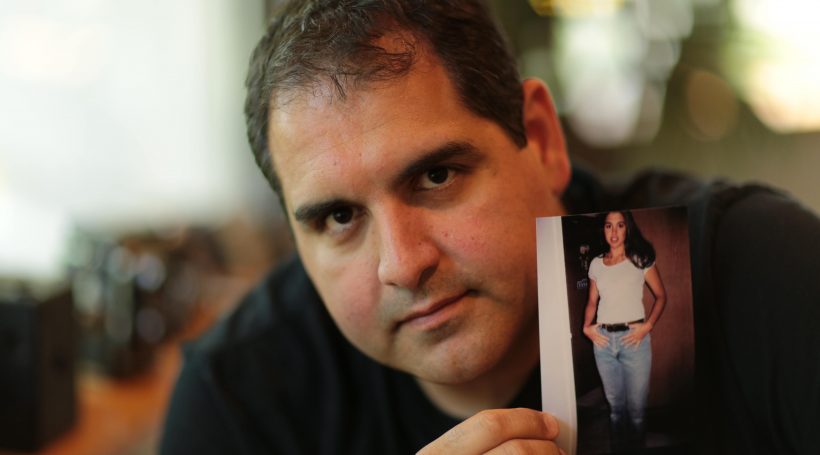Tamer Tewfik will never forget the day his 18-year-old sister Tanya passed out at school and slipped into a coma. Nor will he forget standing in the hospital, just a few days later, listening to a neurologist say Tanya had lost 50 percent of her brain function – and would never regain any of it.
“My mother wouldn’t hear it. She was in complete denial,” he says. So Tewfik’s family took Tanya home, where they cared for her for four years before deciding to remove her feeding tube. “I didn’t just watch my sister wither away, I also watched my mother suffer,” he says.
Unbeknownst to Tewfik and his family, Tanya, who had just started college, had a congenital heart defect that caused her to pass out. When Tanya died, Tewfik was 31 and engaged to be married.
“The feet stomping and yelling happen early on,” says Tewfik, who now lives in Cherry Hill with his wife and two daughters. “Then you go into crisis mode; the tragedy becomes part of your everyday life. Then slowly, very slowly, you realize life goes on.”
While the death of a loved one is never easy to cope with, the lost of a brother or sister can be especially jarring, explains Andra Vasko, director of bereavement for Moorestown Visiting Nurses and Hospice.
“A sibling can be a source of support, in some cases more so than even a spouse or parent,” she says. “You’re losing a person who understands where you come from. It’s shocking and disconcerting to lose a sibling, because that’s potentially the longest relationship you have in a lifetime. It really brings our mortality to the surface.”
Nicholas McCloskey of Beverly was faced with his own mortality when he lost his older brother Michael, who died just days before turning 26.
“My brother was amazing. He was my best friend,” McCloskey says. “He was kind, funny, brave, outgoing and anything you wanted him to be. We had so many things in common.”
McCloskey says that losing his brother, and at such a young age, made him more self-aware.
“Before all this, I didn’t really fear death. I didn’t care if I did dangerous things,” he says. “That’s changed, because I don’t want to put my family through another painful period in their lives. I don’t want to be the one to cause that.”
In addition to the grief caused by the loss of a sibling, the death often changes the dynamics of the family left behind, says Vasko. “Many question how their family will rebalance itself.”
McCloskey admits he and his family are still struggling to answer that question.
“Whenever Mike was around, things were always a little lighter, no matter what the situation was,” McCloskey says. “Even at his wake, everyone was just waiting for him to bust through the doors and make everyone laugh again. Now it’s different. Everyone still has a good time, but in the back of my mind I’m always thinking, ‘Mike could have done that so much better.’”
When a sibling dies, there are no more shared birthday celebrations, anniversaries or holidays. The sense of loss can be overwhelming, and Vasko says many surviving siblings often feel guilty for moving on with their lives. But she suggests the remaining siblings plan activities, like a brunch or even a family reunion.
“Do something as a family that was important to the sibling who died. I knew a family who would volunteer at the Salvation Army just before Christmas every year, because that was something their deceased sibling was passionate about,” Vasko says. “You are just celebrating them in their absence. If the tears come, let that be a part of the evening as well. Bring your grief along. Don’t let it be the centerpiece, but don’t ignore it.”
For McCloskey, his parents and four surviving siblings, that means celebrating Mike’s birthday each year by gathering around the dinner table to share a meal and memories. The McCloskey family also visits Mike’s grave on his birthday, holidays and other days they find themselves missing him. “Whatever we do, we make sure to do it as a family,” McCloskey says.
The grieving process varies from family to family and person to person, and there’s no timeframe for when the pain of living life without a beloved brother or sister will lessen, says Vasko. “To help gain closure, I encourage people to seek grief support. These groups are for people of all ages, including children, who have experienced the loss of a sibling.”
“When people share how they stay connected to their brother or sister, they seem to negotiate their grief better,” Vasko adds. “They get that closure.”
For Tewfik, the key to finding closure from Tanya’s death was keeping her memory alive with his own two children. He remembers how she wanted to affect the world in a positive way, and makes it part of his life too.
“After Tanya died, I committed myself to changing,” he says. “I didn’t want to waste another minute. I take no one for granted. I’ve learned to be a risk taker – I started my own business. I guess you could say I try to pluck all the marrow out of life. Of course, I’d give away all those lessons to have her back.”














